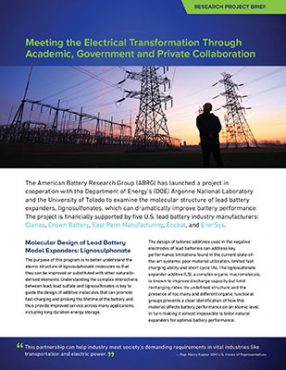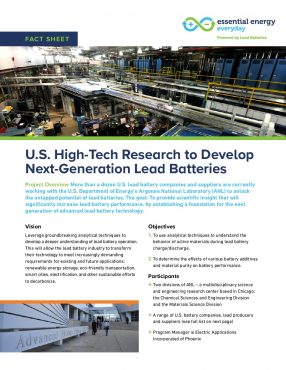Newly Formed Research Collaboration Aims to Extend Lead Battery Performance
WASHINGTON – JULY 29, 2021 — A cohort of U.S. lead battery companies today announced a collaboration with the U.S. Department of Energy’s Argonne National Laboratory and The University of Toledo (UToledo) to improve battery cycling efficiency which would lead to longer life batteries as new applications emerge in an increasingly decarbonized market.
President Biden’s February Executive Order to ensure resilient and diverse supply chains put the spotlight on the need for the U.S. to assert global leadership with home-grown technology to assist in the transition to an electric and decarbonized future. High-capacity batteries will help to enable that process. Advanced lead batteries hold the promise of a truly sustainable, U.S. battery energy storage industry.
The new research collaboration will work to identify methods to extend the life of lead batteries, already known for their low cost, durability and sustainable circular economy. They are ubiquitous and found in applications including automotive, agriculture, defense, telecommunications, logistics and warehousing and renewable energy and more. This new research is unique because it is focused on improving the performance of advanced lead batteries, which are fully recyclable, and for which recycling capacity already exists in the U.S.
Led by Argonne’s Material Science Division in collaboration with Dr. Cora Lind-Kovacs, professor in the UToledo Department of Chemistry and Biochemistry, over the next two years the research team will conduct an atomic level examination of organic materials (also known as “expanders”) to extend the life of lead batteries by improving their cycling efficiency.
Joining Argonne and UToledo are five U.S. lead battery companies: Crown Battery, Fremont, Ohio; Clarios, Milwaukee; East Penn Manufacturing, Lyon Station Penn.; Ecobat, Dallas; EnerSys, Reading, Penn.; and U.S. Representative Marcy Kaptur (D-OH), chair of the U.S. House Appropriations Energy and Water Development Subcommittee, helped bring the consortium partners together, connecting UToledo’s unique capabilities with Argonne and the five lead battery companies.
“This partnership can help industry meet society’s demanding requirements in vital industries like transportation and electric power,” Kaptur said. “UToledo’s chemistry department will bring their expertise to help meet the growing need for more efficient and sustainable rechargeable batteries to support a changing economy.”
Hal Hawk, president of Fremont, Ohio, battery manufacturer Crown Battery, noted that “Our firm has worked with UToledo for many years. They have helped our company with important research and we look forward to having the university’s expertise deployed in this new national consortium with others in the lead battery industry.”
The U.S. lead battery industry has an annual economic impact of $26.3 billion with more than 92,000 direct and indirect jobs across 38 states. Lead batteries are a baseline energy storage technology used in automotive, telecommunications, electric power, mining, agriculture, marine, and data centers. They are the most recycled product in the world, boasting a 99% recycling rate. Lead batteries provide 60% of the global rechargeable energy storage market, and have significant potential for even better performance to serve increasingly demanding requirements for vehicle electrification and the integration of renewable power to the electric grid.
“We are excited to collaborate with Argonne National Laboratory and the American Battery Research Group to investigate the atomic level mechanism of how expander molecules interact with the different lead species present in batteries,” Lind-Kovacs said. “This is a great opportunity to use our expertise in materials chemistry at UToledo to work closely with several companies to help address a relevant industrial problem.”
Scientists are increasingly intrigued by the underutilized potential of materials that could lead to more efficient performance in lead batteries (see “Past, present, and future of lead-acid batteries”). Researchers have noted that the key to extending lead battery life is to investigate the interaction among materials and the improper formation of crystals that can limit battery life span. For this new project, Argonne and UToledo will target lignosulfonates, naturally occurring organic materials used in the lead battery’s negative plates to maintain the optimum flow of energy from the battery. This cooperative research and development agreement (CRADA) marks the second major collaborative research project between the lead battery industry and Argonne. The first research program, identified several critical battery additives for intensive research, including the lignosulfonates under investigation here.
The project’s industry partners, Crown Battery, Clarios, East Penn Manufacturing, Ecobat, and EnerSys, are members of Battery Council International (BCI), the Consortium for Battery Innovation (CBI) and the Lead Battery Science Research Program (LBSRP), which has an existing CRADA with Argonne. The new program is being supervised by the American Battery Research Group (ABRG).
Note to editors: A fact sheet with more details on the project can be found here.
About Battery Council International
Battery Council International (BCI) is the North American trade association representing the lead-based battery manufacturing, supply, recycling and distribution companies. For more information on the association, visit www.batterycouncil.org.








